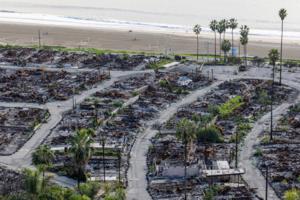Current News
/ArcaMax

Trump suggests Paxton's defiance in Senate race could push him to endorse Cornyn
President Donald Trump on Thursday brushed off Texas Attorney Gen. Ken Paxton’s insistence that he will stay in the Republican U.S. Senate race even if Trump endorses his rival, incumbent Sen. John Cornyn.
After Paxton said he won’t drop out of the May 26 runoff, the president reportedly suggested Paxton’s defiance could backfire by ...Read more

Rand 2028? Kentucky bill would allow some to run for federal office and president
LEXINGTON, Ky. — In politics, candidates usually can only run for one office at a time.
But Kentucky Sen. Rand Paul and other federal officeholders would, by law, be able to run for reelection and president in 2028 under a bill advancing in the GOP-led state Legislature.
House Bill 534 from Rep. DJ Johnson, R-Owensboro, passed the House ...Read more

Trump fires Homeland Security Secretary Kristi Noem
President Donald Trump on Thursday fired Homeland Security Secretary Kristi Noem after a string of perceived missteps mostly related to the controversial immigration crackdown in Minneapolis and elsewhere.
Trump announced on his social media site that he plans to replace Noem with Sen. Markwayne Mullin, R-Oklahoma, who will take over at the end...Read more

Owners of fire-destroyed Palisades mobile home park seek to displace residents for development deal
LOS ANGELES — For months, former residents of the Pacific Palisades Bowl Mobile Estates have feared the uncommunicative owners of the property would seek to displace them in favor of a more lucrative development deal after the Palisades fire destroyed the rent-controlled, roughly 170-unit mobile home park.
A confidential memorandum listing ...Read more

Springing forward again: Nevada's time-change fight stalls as health risks tick up
LAS VEGAS — Legislative proposals to sunset daylight saving time have come, stalled or gone away, and spring forward season is again upon Nevada.
That means later sunrises and sunsets, but it also means the need to adjust clocks — both external and internal.
The lost hour — when 2 a.m. Sunday will suddenly turn to 3 a.m. — can be ...Read more

Europe commits to expanding Iran campaign as Israel strikes southern Lebanon
WASHINGTON — New signs of a widening regional conflict emerged Thursday as the war with Iran entered its sixth day, with European allies pledging warships and access to military bases for the U.S. campaign, Israel intensifying strikes in Lebanon against Hezbollah militants, and Kurdish forces preparing for a potential incursion into northern ...Read more

Trump fires Homeland Security Secretary Kristi Noem
President Donald Trump on Thursday fired Homeland Security Secretary Kristi Noem after a string of perceived missteps mostly related to the controversial immigration crackdown in Minneapolis and elsewhere.
Trump announced on his social media site that he plans to replace Noem with Sen. Markwayne Mullin, R-Okla.
“(Noem) has served us well, ...Read more

Gisele Fetterman's X and Instagram profiles are now inactive weeks after she spoke against ICE
Gisele Barreto Fetterman‘s social media accounts have been taken down after she spoke out about U.S. Immigration and Customs Enforcement earlier this year. Her X and Instagram accounts were both inactive as of Thursday morning.
It’s unclear what date the two accounts were removed from the platforms, but she did use her X account to ...Read more

Trump removes Noem as DHS chief, installs GOP Sen. Markwayne Mullin
WASHINGTON — President Donald Trump on Thursday ousted the embattled Homeland Security Secretary Kristi Noem from her post and said he would install Oklahoma Sen. Markwayne Mullin as its acting chief.
Amid his reported months of frustrations with Noem, Trump announced she would take on a new role.
“The current Secretary, Kristi Noem, who ...Read more

Inmate and former Democratic donor Ed Buck must pay victim's mother $2 million, jury says
LOS ANGELES — Democrat donor Ed Buck, once a fixture of West Hollywood politics who is now in federal prison for sex and drug crimes, must pay $2 million to the mother of one of his victims as a result of a wrongful death lawsuit.
A jury of five men and three women unanimously found Buck liable for the drug overdose death of Gemmel Moore in ...Read more

Republican NC elections board member resigns days after primary election
RALEIGH, N.C. — Bob Rucho, a Republican member of the North Carolina State Board of Elections, announced his resignation Thursday, just one day after a conservative activist called for his removal for past comments he made about Senate leader Phil Berger’s reelection campaign.
Berger, who faced a tough Republican primary campaign against ...Read more

Detroit mom charged after daughter, 6, fatally shot with unsecured gun
DETROIT — A Detroit mother was charged with a felony after her 6-year-old daughter died when she was left with her siblings in a vehicle outside a restaurant with an unsecured handgun, according to prosecutors.
Tonya Johnson, 41, allegedly left her five children, ages 2 to 11 years old, unattended in her car Monday while she was inside a ...Read more

Condor couple may be tending to first egg in Northern California in a century
A California condor known as Ney-gem’ ‘Ne-chweenkah’ — Yurok for “She carries our prayers” — has been flying to a particular spot deep inside Redwood National Park, near Klamath.
Then she leaves and another — nicknamed ‘Hlow Hoo-let’, or “At last I (or we) fly!” — has been arriving.
Yurok wildlife officials say this ...Read more

Former President Obama throws support behind Virginia Democrats' redistricting effort
NORFOLK, Va. — Former President Barack Obama on Thursday threw his weight behind Virginia Democrats’ effort to get new congressional maps approved ahead of the November midterm elections.
Obama is featured in a video paid for by Virginia for Fair Elections calling out Republican-led states that have “taken the unprecedented step” of ...Read more

LA County banned sales of kratom. Now some residents say they're losing a lifeline for pain and opioid withdrawal
LOS ANGELES — Los Angeles County banned sales of kratom and 7-OH in November following overdose deaths, but experts question whether the drugs alone caused the fatalities.
Residents who relied on kratom for chronic pain and opioid withdrawal now struggle to access the substance, turning to online orders and black markets.
The crackdown ...Read more

Blue states push to ban ICE at the polls amid federal voter intimidation fears
Several Democratic states are moving to bar federal immigration agents from being near polling places and other election sites, amid persistent worries that President Donald Trump will use federal law enforcement or the military to disrupt the midterm elections.
Measures to restrict federal agents from operating at or near election-related ...Read more

Trump insists he must play role in picking new Iran leader as war rages on
President Donald Trump on Thursday insisted he must personally play a role in picking a new leader of Iran as the war against Tehran raged on with no end in sight.
Trump compared the selection of a new leader in Tehran to the U.S. military action in Venezuela that replaced President Nicolas Maduro with his onetime lieutenant Delcy Rodriguez.
�...Read more

Central Appalachian commissioners rubber stamp 'no' vote on mega landfill project
PIKEVILLE, Ky. — A project from an out-of-state waste management company to build a mega landfill on an abandoned coal mine in the central Appalachian community of Myra is dead after Pike County commissioners affirmed their decision to back out the contract this week.
Over the strong objections of Judge-Executive Ray Jones, he and the ...Read more

Thousands flee Beirut suburbs after unprecedented Israeli evacuation order
BEIRUT — The Israeli military issued evacuation orders for entire neighborhoods of Beirut's southern suburbs, sparking pandemonium as hundreds of thousands of people joined a panicked exodus out toward Lebanon's north.
On Thursday afternoon, the Israeli military's Arabic-language spokesman told residents of the Dahieh — the Hezbollah-...Read more

Nancy Guthrie kidnap probe hits another dead end with DNA results on found gloves
In another setback for the Nancy Guthrie kidnap probe, DNA on a glove found in the first weeks of the investigation turned out to belong to a restaurant worker and is unrelated to her masked abductor, officials said.
The news came as Savannah Guthrie, one of Nancy’s daughters and co-anchor of NBC’s “Today” show, on Thursday made an off-...Read more
Popular Stories
- Iran's Navy in crosshairs as US strikes warship with submarine
- Outer Banks erosion reveals buried whale, NC group says. 'Stinks to high heaven'
- Ex-Illinois inmate's lawsuit over forced labor induction tests Gov. JB Pritzker on reproductive rights
- Florida taxpayers likely on the hook for Alligator Alcatraz
- States try 'public option' Obamacare plans to reduce coverage costs





